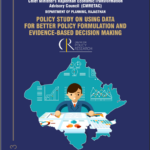
Empowering School Management Committees- Helping SMC members plan better
11 June 2012
Laina Emmanuel, Accountability Initiative
Parental involvement in children’s education is largely believed to lead to improved learning outcomes. The level of involvement can vary from providing a secure home for children, maintaining a healthy parent-teacher communication, volunteering to involving parents in the governance of the school[1]. The effect of each type of parental involvement on learning outcomes also varies, though research largely points towards beneficial effects.
Recognizing this, the architects of the Right to Education (RTE) Act mandated parental involvement in schools through School-Based Management Committees. These committees are tasked with making School Development Plans[2] among other tasks[3]. But how successful are school committees in discharging this responsibility? Our field research has helped us see the ground realities of School Management Committees (SMCs). Take for example, these quotes from the stories our PAISA associates sent us from the field[4] which show the information and capacity problems SMC’s face.
– “We found that the SMC members were not even aware that they are members” –Swapna Ramtake, Sagar, Madhya Pradesh
– “SMC members don’t make the connection between their attending meetings and the quality of outcomes in the school” – Poonam Choudhary, Jaipur, Rajasthan
– “We met the lady who was made the SMC head by the headmaster, and she was never told what her roles and responsibilities are” – Seema Muskan, Nalanda Bihar
In addition to these information and capacity problems, there is another problem which Avani had briefly mentioned in her previous blog i.e. the lack of management skills in an SMC member or the lack of planning tools to help them plan better. To quote her – “Until we are able to staff and strengthen our management structures at every level of government – national, state, block, cluster and SMC – timely and efficient implementation of the programme will remain a challenge”
Before we look for solutions to these management challenges, it would help our reader to have in mind the picture of an SMC member from the PAISA districts work inworking in. An average SMC member is a person who can ill-afford to give up his/her daily wage to sit around in a meeting in which his/her doesn’t see value, is usually illiterate but clearly sees the value of education in improving his/her child’s future, he/she does not feel they can hold a government school teacher accountable as he/she thinks government school education is a free service and charity.[5] Also, apart from the charity aspect, parents who are uneducated find it very difficult to question an educated Headmaster and so are unable to pressurize the HM to correct things, or take steps for grievance redressal if it involves interacting with govt officials.
Coming back to the problem of lack of management skills, how do you ensure an average SMC member can actually plan for their schools? What tools, methodologies, skills can we impart to them to ensure that their plans are comprehensive and reflect the ground-realities of their schools?
Whatever be our solution, they should be simple enough so as to ensure parents (or SMC facilitators) spend minimum amount of time learning the solution. Complicated decision matrices and 2by2’s are not going to cut it. So what do we do?
Our next PAISA course module focusses on collectively finding a solution. Our 9 PAISA associates are traveling from various parts of the country to Delhi to attend a 5 day tool-creation workshop. Each of them is carrying with them a treasure-house of field experience. Collectively with the analyst team based in Delhi, we are going to spend 5 intense days, figuring out how we can best help SMC’s plan better. Joining us in the brainstorming and creative processes, are 3 master trainers for ASER from Chattisgarh, who would be later working on building SMC capacity. We would also be joined over Skype by grassroot planners from Kutch who have worked extensively on school-related issues such as bringing out-of-school children to school and monitoring school programmes. We would hopefully be joined by SMC members themselves from Kutch. And through this collective brainstorming, we hope to come up with solutions and tools which can help SMC’s plan better for their school.
After creating these tools, our PAISA associates would pilot them in their districts, and hopefully we would be able to answer questions about what kind of community involvement in school governance can help improve learning outcomes. We are very excited about this project, and will keep you informed.
[1] Epstein’s framework for six types of involvement talks about the various levels of involvement.
[2] Under Section 22(1) of the RTE, schools are required to prepare a School development plan. The school development plans contain the list of prioritized activities to be undertaken at the school level. It’s a three year plan estimating student strength, teacher requirement under the prescribed PTR, additional infrastructural, financial requirements and so on.
[3] The RTE guideline mentions specific functions to be performed by the SMC like (i) monitor school activities and its working, (ii) prepare and recommend school development plan, (iii) monitor grant utilization, (iv) monitor teachers’ and students’ attendance, (v) monitor MDM, (vi) ensure 100% enrollment of children in the age group of 6-14 year
[4] The PAISA associates send us detailed stories from the field. We would be later compiling them into a ‘Handbook for conducting PAISA’
[5] See Rukmini’s article – http://www.accountabilityindia.in/accountabilityblog/2224-hamara-gaon-hamara-school-my-village-my-school





